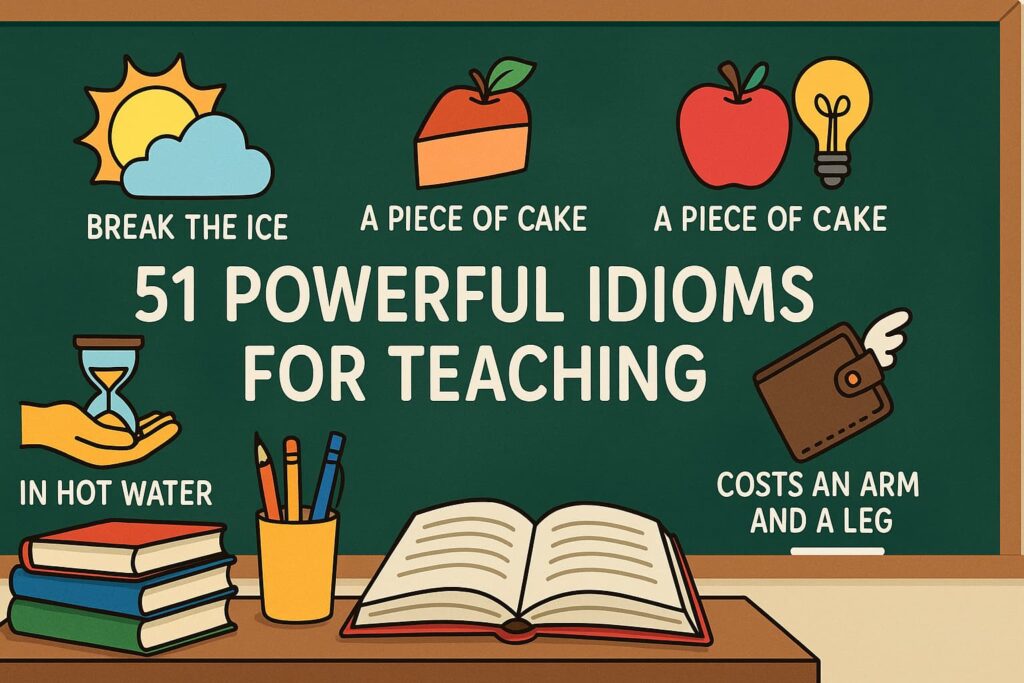Teaching is full of vibrant language, and idioms bring lessons to life. Below you’ll find 51 unique idioms every educator can use, each with a clear meaning, a classroom-focused example, and alternative ways to express the same idea. This structure is inspired by the clarity and depth of the simile outline you referenced.
1. Break the ice
Meaning: To initiate conversation or make a situation less awkward.
In a Sentence: The new student told a joke to break the ice during lunchtime.
Other Ways to Say: Start a conversation, warm up the crowd.
2. Hit the books
Meaning: To study hard.
In a Sentence: Before the big exam, everyone in class had to hit the books.
Other Ways to Say: Study intensively, cram.
3. Learn the ropes
Meaning: To understand the basics of a task.
In a Sentence: New teachers spend the first week learning the ropes.
Other Ways to Say: Get the hang of, pick up the basics.
4. Think on your feet
Meaning: To respond quickly and effectively.
In a Sentence: When the projector broke, Ms. Lee had to think on her feet.
Other Ways to Say: Improvise, react quickly.
5. Pass with flying colors
Meaning: To succeed brilliantly.
In a Sentence: She passed her teaching exam with flying colors.
Other Ways to Say: Succeed easily, ace it.
6. Cover a lot of ground
Meaning: To deal with a lot of information or material.
In a Sentence: We covered a lot of ground in today’s history lesson.
Other Ways to Say: Make rapid progress, move quickly.
7. A for effort
Meaning: To recognize someone’s hard work, even if they didn’t succeed.
In a Sentence: He didn’t win, but he definitely gets an A for effort.
Other Ways to Say: Credit for trying, good attempt.
8. Uphill battle
Meaning: A difficult task.
In a Sentence: Teaching grammar to beginners can be an uphill battle.
Other Ways to Say: Tough challenge, hard struggle.
9. Spark an interest
Meaning: To inspire curiosity or enthusiasm.
In a Sentence: The science experiment sparked an interest in chemistry.
Other Ways to Say: Ignite curiosity, stimulate interest.
10. Catch someone’s eye
Meaning: To attract attention.
In a Sentence: Her creative project caught the teacher’s eye.
Other Ways to Say: Draw attention, stand out.
11. Talk someone’s ear off
Meaning: To talk excessively.
In a Sentence: After the field trip, the students talked their teacher’s ear off.
Other Ways to Say: Chat endlessly, ramble.
12. Back to square one
Meaning: To start over.
In a Sentence: When the experiment failed, we had to go back to square one.
Other Ways to Say: Start again, return to the beginning.
13. Climb the walls
Meaning: To feel restless or bored.
In a Sentence: The students were climbing the walls during the rainy-day recess.
Other Ways to Say: Get stir-crazy, feel fidgety.
14. Method to the madness
Meaning: A reason for strange behavior.
In a Sentence: There’s a method to the madness in her teaching style.
Other Ways to Say: Hidden logic, sense in chaos.
15. Bell the cat
Meaning: To take on a difficult or dangerous task.
In a Sentence: Someone had to bell the cat and tell the principal about the problem.
Other Ways to Say: Take the risk, face the challenge.
16. Read between the lines
Meaning: To find the hidden meaning.
In a Sentence: You have to read between the lines to understand the poem.
Other Ways to Say: Interpret, look deeper.
17. On the ball
Meaning: To be alert and competent.
In a Sentence: The substitute was really on the ball today.
Other Ways to Say: Sharp, attentive.
18. Piece of cake
Meaning: Something very easy.
In a Sentence: The quiz was a piece of cake for the class.
Other Ways to Say: Simple, effortless.
19. Cost an arm and a leg
Meaning: To be very expensive.
In a Sentence: The new textbooks cost an arm and a leg.
Other Ways to Say: Very costly, pricey.
20. Get the ball rolling
Meaning: To start something.
In a Sentence: Let’s get the ball rolling on the group project.
Other Ways to Say: Begin, kick things off.
21. Go the extra mile
Meaning: To do more than what is required.
In a Sentence: She always goes the extra mile for her students.
Other Ways to Say: Exceed expectations, go above and beyond.
22. Hit the nail on the head
Meaning: To describe exactly what is causing a situation.
In a Sentence: You hit the nail on the head with your analysis.
Other Ways to Say: Be exactly right, pinpoint.
23. In the same boat
Meaning: To be in the same situation.
In a Sentence: We’re all in the same boat with this new curriculum.
Other Ways to Say: Share the same problem, united in challenge.
24. Jump on the bandwagon
Meaning: To join others in doing something popular.
In a Sentence: Many teachers jumped on the bandwagon and started using online quizzes.
Other Ways to Say: Follow the trend, join in.
25. Kill two birds with one stone
Meaning: To accomplish two things at once.
In a Sentence: The field trip killed two birds with one stone: fun and learning.
Other Ways to Say: Solve two problems at once, multitask.
26. Let the cat out of the bag
Meaning: To reveal a secret.
In a Sentence: He let the cat out of the bag about the surprise party.
Other Ways to Say: Spill the beans, reveal.
27. Miss the boat
Meaning: To miss an opportunity.
In a Sentence: If you don’t apply now, you’ll miss the boat.
Other Ways to Say: Lose the chance, miss out.
28. On thin ice
Meaning: In a risky situation.
In a Sentence: After being late again, he’s on thin ice with the teacher.
Other Ways to Say: In trouble, at risk.
29. Pull strings
Meaning: To use influence to get something.
In a Sentence: She pulled some strings to get extra funding for the club.
Other Ways to Say: Use connections, leverage influence.
30. Raise the bar
Meaning: To increase standards or expectations.
In a Sentence: The new program raises the bar for student achievement.
Other Ways to Say: Set a higher standard, increase expectations.
31. Smooth sailing
Meaning: Easy progress.
In a Sentence: After the first week, teaching was smooth sailing.
Other Ways to Say: Trouble-free, easy going.
32. Take with a grain of salt
Meaning: To view something skeptically.
In a Sentence: Take rumors about the test with a grain of salt.
Other Ways to Say: Be skeptical, question.
33. Throw in the towel
Meaning: To give up.
In a Sentence: Don’t throw in the towel just because the lesson is tough.
Other Ways to Say: Quit, surrender.
34. Up in the air
Meaning: Unsettled or undecided.
In a Sentence: The date for the school play is still up in the air.
Other Ways to Say: Uncertain, undecided.
35. Venture a guess
Meaning: To make a guess.
In a Sentence: Can anyone venture a guess about the answer?
Other Ways to Say: Take a guess, speculate.
36. Walk on eggshells
Meaning: To act very carefully.
In a Sentence: After the argument, everyone was walking on eggshells.
Other Ways to Say: Be cautious, tread carefully.
37. X marks the spot
Meaning: The exact location.
In a Sentence: X marks the spot for the hidden answer on the map.
Other Ways to Say: Here it is, the exact place.
38. Yearn for knowledge
Meaning: To have a strong desire to learn.
In a Sentence: She yearns for knowledge and always asks questions.
Other Ways to Say: Thirst for learning, crave understanding.
39. Zero in
Meaning: To focus closely.
In a Sentence: Let’s zero in on the main idea of the story.
Other Ways to Say: Focus, concentrate.
40. Bite off more than you can chew
Meaning: To take on too much.
In a Sentence: He bit off more than he could chew with five projects at once.
Other Ways to Say: Overcommit, take on too much.
41. Cut corners
Meaning: To do something badly or cheaply.
In a Sentence: Don’t cut corners on your research.
Other Ways to Say: Skip steps, do carelessly.
42. Down to the wire
Meaning: Until the last possible moment.
In a Sentence: The essay was finished down to the wire.
Other Ways to Say: Last minute, just in time.
43. Eureka moment
Meaning: A sudden realization.
In a Sentence: She had a eureka moment during the math lesson.
Other Ways to Say: Sudden insight, breakthrough.
44. Face the music
Meaning: To accept the consequences.
In a Sentence: He had to face the music after missing class.
Other Ways to Say: Accept responsibility, deal with consequences.
45. Get into the swing of things
Meaning: To become accustomed to something.
In a Sentence: It took a week to get into the swing of things.
Other Ways to Say: Adjust, get used to it.
46. Hit a snag
Meaning: To encounter a problem.
In a Sentence: We hit a snag with the group project.
Other Ways to Say: Run into trouble, face a setback.
47. In over one’s head
Meaning: To be involved in something too difficult.
In a Sentence: He felt in over his head with advanced calculus.
Other Ways to Say: Overwhelmed, out of depth.
48. Jog one’s memory
Meaning: To help someone remember.
In a Sentence: The photo jogged her memory about the event.
Other Ways to Say: Remind, trigger recall.
49. Keep one’s nose to the grindstone
Meaning: To work hard and continuously.
In a Sentence: She kept her nose to the grindstone all semester.
Other Ways to Say: Work diligently, persist.
50. Lose one’s train of thought
Meaning: To forget what one was saying.
In a Sentence: The interruption made him lose his train of thought.
Other Ways to Say: Forget, get distracted.
51. Make ends meet
Meaning: To manage financially.
In a Sentence: Many teachers work extra jobs to make ends meet.
Other Ways to Say: Get by, manage.
20 Idiom Practice Quiz
Fill in the blank with the correct idiom from above.
- When the new student arrived, the teacher told a funny story to ________.
- Before finals, everyone had to ________.
- The substitute teacher was really ________ and kept the class engaged.
- The principal said the new policy would ________ for everyone.
- After the failed experiment, we had to ________.
- She always ________ for her students, staying after school to help.
- The students were ________ during the long assembly.
- The teacher said, “Let’s ________ on the main topic.”
- He ________ by volunteering for three committees at once.
- The club’s funding was ________, so they held a fundraiser.
- The science fair project ________ when the materials didn’t arrive.
- Her creative essay really ________.
- The group finished their project ________.
- She had a ________ when she solved the puzzle.
- The teacher told everyone to ________ and not get discouraged.
- He ________ when he forgot his homework again.
- The field trip ________: students learned and had fun.
- The new textbooks ________.
- The teacher had to ________ when the lesson plan changed suddenly.
- The students were ________ after the heated debate.
Answer Key
- break the ice
- hit the books
- on the ball
- raise the bar
- go back to square one
- goes the extra mile
- climbing the walls
- zero in
- bit off more than he could chew
- up in the air
- hit a snag
- caught the teacher’s eye
- down to the wire
- eureka moment
- keep their nose to the grindstone
- faced the music
- killed two birds with one stone
- cost an arm and a leg
- think on her feet
- walking on eggshells
Conclusion
Idioms make teaching and learning more expressive, relatable, and fun. Use these 51 idioms to enrich your lessons, foster engagement, and help students understand the nuances of English in real-life contexts. Practice with the quiz, and soon your students will be using these idioms as naturally as native speakers!



